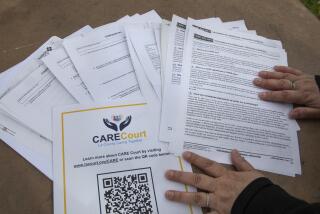He returns to General Hospital under happier circumstances . . . and finds a group that CARES
- Share via
Since the doctors and nurses at General Hospital had undoubtedly saved my life, I was happy to accept an invitation from the auxiliary, CARES, to visit their hospital child care center.
It is just next door to the emergency unit to which, at death’s door, I was taken two years ago.
CARES is a halfway acronym for the nonprofit Los Angeles County/USC Medical Center Auxiliary for Recruitment, Education and Service.
It was raining and the wind was cold the day I visited. The center’s outdoor playground was deserted. Its playhouse, slides and tables looked cold and lonely.
Forty children were inside the cozy center. They didn’t notice me. The room was partitioned into nooks, with a bathroom and a tiny kitchen.
Eight small children were playing around a table at which a teacher sat unperturbed. The children were playing with colored plastic modules, a playhouse, a zoo, trucks and other toys. There was no evident cohesion. Each child seemed to be playing separately, pursuing his own fantasy. A girl was assiduously placing plastic modules in a plastic box; a boy was assiduously taking them out. Neither seemed aware of the other’s game. Somehow, in some subtle way, the teacher seemed to be in control.
Five cribs stood against a wall. Three were occupied. I looked into an enormous pair of brown eyes. Their owner smiled. It was the first time a baby had smiled at me in years.
The director took a minute to talk to me. She was Elizabeth E. Deese, a Ph.D. in education and human development. She wore a white smock with a stylized CARES imprinted all over it in blue. Her staff members wore the same smock--”so they know us all over the hospital,” she explained. “They can grab us and say, ‘I need help.’ ”
The center harbors 20,000 children a year while their mothers or fathers are receiving medical care. Another center serves the outpatient clinic. They do not simply baby-sit. They help the family in every way: education, emotional support, counseling. And all free.
(All this costs money. As a fund-raiser, CARES will hold its California National Horse Show from Wednesday, March 11, to Sunday, March 15, at the Los Angeles Equestrian Center, 480 Riverside Drive, Burbank.)
Every week has a theme, Dr. Deese said. “This week is animal week.”
Part of a wall was covered with pictures of animals cut from magazines. She picked up a flat stuffed animal evidently made from newsprint and painted with poster paint.
“That’s a turtle,” she said. “It’s stuffed with newspaper. We beg, borrow and steal everything we can.”
A long, curled, exotic snake hung from the ceiling. It had dots, pyramids, half-moons, stripes and other decorations on it. It looked like the original snake from the Garden of Eden.
“The children love that snake,” she said.
A staffer in a CARES smock was telling a dozen children to form a line in front of the bathroom. She held towels.
“Make a line,” she said. “One at a time. Wash your hands.”
They did. I had a feeling that the room was packed with energy that might explode at any moment, like some unstable atomic pile; but the children were charming and polite.
They sat at tables on oak chairs 10 inches high and lunch was served on plastic plates: half a meat-and-cheese sandwich, an orange quarter, a cookie and a plastic cup of juice.
My eye fell on a girl in a white sweater. Her eyes were dark and her black hair was in a pigtail. She opened her sandwich, extracted her slice of cheese, got up and took it into the kitchen, came back, closed her sandwich and began to eat it.
I leaned over. “You don’t like cheese?”
She looked startled and guilty. I realized that because I was old and tall I must look like an authority figure. I wanted to let her know that I wasn’t.
“I don’t like cheese either,” I said.
She smiled. It was all right. We were conspirators.
A man came in with two small boys both wearing khaki parkas. They looked like twins. The man had a leather jacket slung over his shoulders. One arm was in a full cast.
He signed the boys in. They clung to his sleeves, scowling, not wanting him to leave them. He pulled away. They started to scream. Dr. Deese bent over and snatched one into her arms. She took him quickly to a rocking chair, as his father made his exit. The boy cried and screamed.
“You want something to eat?” Dr. Deese asked him.
The tears stopped. He nodded.
A few minutes later the two boys had been fed and were playing with a vengeance.
Dr. Deese told me, “Most of the time, if you move in real fast, before they get hysterical, they’re OK.”
A staffer was organizing a game of musical chairs. She placed two rows of six chairs back to back and turned on a tape player. Thirteen children walked around the chairs, clapping hands. The music stopped. They dove for chairs. One was left out, and a chair was removed.
I noticed that the girl who didn’t like cheese was still in it. I kept my eye on her. She was obviously quick and intelligent. I hoped she’d win. They were down to about five chairs when the music stopped. She got safely into a chair. But a much larger boy bumped her out of it.
Oh well, I thought, that’s life. She might as well learn.
More to Read
Sign up for Essential California
The most important California stories and recommendations in your inbox every morning.
You may occasionally receive promotional content from the Los Angeles Times.













